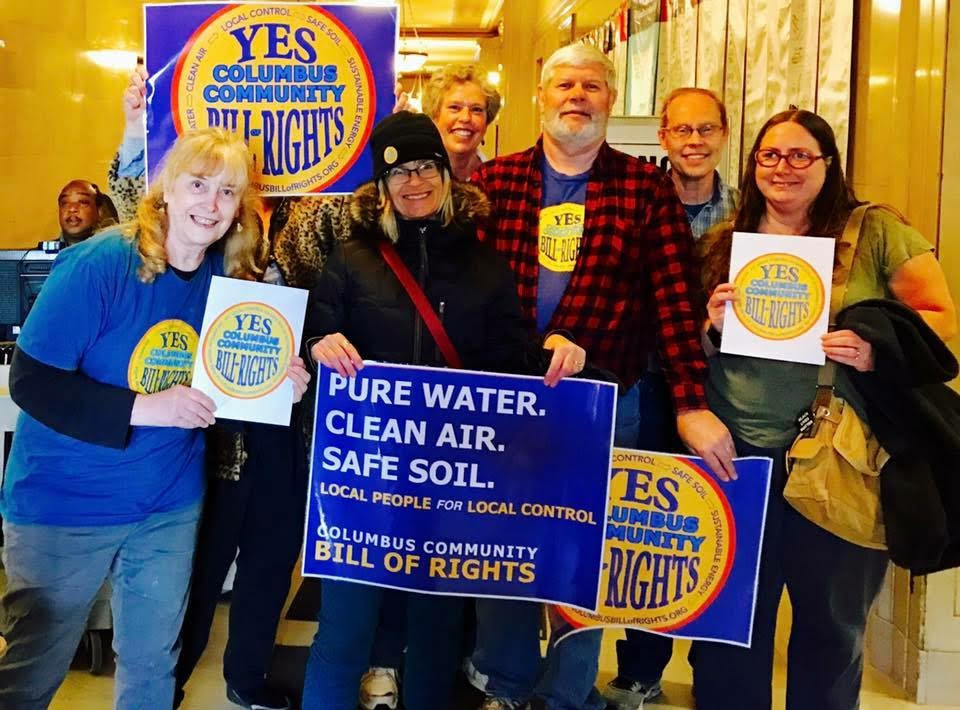Contacts:
Tish O’Dell, CELDF Consulting Director Tish@CELDF.org 440-552-6774
Bill Lyons, Columbus Community Bill of Rights wmlyons@gmail.com 614-551-6194
COLUMBUS, OH – What can a community do when the democratic process itself has been outlawed?
That’s the question facing residents of Ohio. In 2019, the State legislature prohibited communities from enacting “rights of nature” laws after Toledo residents overwhelmingly voted for a law, the Lake Erie Bill of Rights. The budget bill passed on July 17th of that year established that “nature… does not have standing to participate in or bring an action in any court.”
In 2020, the State doubled down, passing a so-called “preemption law” in response to the city of Athens and Cuyahoga County (where Cleveland is located) passing laws banning single-use plastic bags.
Some Columbus residents, like Bill Lyons of the Ohio Community Rights Network, say that enough is enough.
“The shredding of Ohioans Constitutional home-rule and local self-governing rights has gone on too long,” says Lyons, “it is time for the people of Columbus to reclaim these rights so that we can truly create the just city we envision for ourselves, the natural environment, and future generations.”
Lyons and other local citizens are seeking to overturn this undemocratic process within their city. On May 15th, they submitted a proposed city charter amendment initiative petition to the city, seeking to ask voters on the November 2027 ballot if they will reject state preemption and reaffirm the right to make decisions locally.
The proposed amendment states that “the principle and practice of home rule and local self-government in Ohio, as established in 1912, has been increasingly infringed upon and eroded by state legislature overreach via the practice of state preemption,” including by preventing residents from legislating on important community issues such as “minimum wage protections, gun laws, oil and gas bans, rent control protections, knife laws, plastic bag bans, rights of nature, flavored tobacco bans, pesticide use, red-light camera use, telecommunication installations, natural gas hookup bans, puppy mill bans, paid leave, and many others.”
Since 2012, over three dozen rights of nature and community rights initiatives for inclusion on city and county ballots in Ohio have faced varying levels of obstruction from the state. Fifteen measures have been kept off the ballot. Of those that did make it onto ballots, six were passed into law by voters, and one by city council vote.
According to Grace Leng of Rank The Vote Ohio, this is a fundamental violation of democracy and self-determination.
“Ohio cities’ constitutional right to home rule is vital for local self-government,” Leng says. “State preemption undermines the community’s ability to address local needs and puts decisions in the hands of politicians detached from we the people.”
Another supporter of the effort is Columbus resident Greg Pace, who says that this fight echoes one that took place over a hundred years ago.
“It was a long and contentious fight by the people to add into the Ohio constitution in 1912 the right to modify the laws of the state through citizen initiatives,” Pace says. “Those rights have been systematically liquidated over the past century by the state legislature. Home rule in Ohio has taken a similar turn, as the legislature reactively shuts down local laws that big-moneyed lobbying interests dislike. In today’s political climate, it is more important than ever for our democratic way of life, to affirm our rights and protect our community turf, health and especially our safety.”
Detractors of the bill have argued that home rule opens up the possibility for communities to legislate regressive retractions of rights. But the proposed amendment in Columbus sidesteps those concerns since local laws passed under the bill cannot legally “alter or restrict the existing fundamental rights of natural persons, their local communities, or nature [or] weaken protections for natural persons, their local communities, or nature provided by state, federal, or international law.”
In other words, Columbus will be able to pass laws that strengthen the rights and protections already recognized for living entities, but not laws that weaken them.
“The state should be able to set baseline protections for things like minimum wage and environmental protection,” says Lyons. “But for the state to outlaw communities from implementing higher levels of protection for health, safety and welfare through what’s called ‘ceiling preemption’ is unjust, immoral, and should be illegal.”
The Community Environmental Legal Defense Fund (CELDF), an organization that specializes in working with communities to draft bills, has been assisting organizers in Columbus since 2015 with ordinances and charter amendments to protect the community’s water, air, soil and residents from the toxic effects of fracking. All four of this group’s previous attempts have been kept off the ballot for one reason or another, with preemption being a factor in several of the denials.
Tish O’Dell, Consulting Director at CELDF, has been involved with every one of their attempts. “I am so impressed with the tenacity and evolution of this group of residents,” she says. “Columbus is the state capital and largest city in Ohio, so collecting the required amount of signatures to get an initiative on the ballot is hard. And yet, they keep coming back.”
To learn how you can help with this campaign locally, please contact Columbus Community Bill of Rights at their website or Bill Lyons directly at wmlyons@gmail.com.
To learn more about all the previous efforts in Columbus and other Ohio communities, you can read the book “Death By Democracy – Protecting Water and Life: Frontline Stories from Ohioans fighting Corporate and State Power.”
###
About CELDF — Community Environmental Legal Defense Fund – celdf.org
CELDF is a nationwide community of organizers, lawyers, and partners who educate, agitate, and organize to confront systemic injustice and restore humanity’s reciprocal relationship with Earth. For over 30 years, we’ve helped communities resist corporate exploitation, reject regulatory false promises, and assert their right to self-govern through systems grounded in ecological balance and collective local power.
More information about CELDF, including photos pre-approved for media use, can be found in our press kit.



